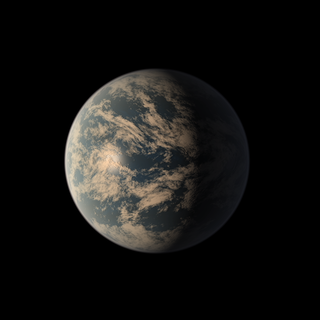TRAPPIST-1 d

Description: TRAPPIST-1d is a small exoplanet, which orbits on the inner edge of the habitable zone of the ultracool dwarf star TRAPPIST-1, located 40.7 light-years away from Earth in the constellation of Aquarius. The exoplanet was found by using the transit method. The first signs of the planet were announced in 2016, but it was not until the following years that more information concerning the probable nature of the planet was obtained. TRAPPIST-1d is the second-least massive planet of the system and is likely to have a compact hydrogen-poor atmosphere similar to Venus, Earth, or Mars. It receives just 4.3% more sunlight than Earth, placing it on the inner edge of the habitable zone. It has about <5% of its mass as a volatile layer, which could consist of atmosphere, oceans, and/or ice layers. A 2018 study by the University of Washington concluded that TRAPPIST-1d might be a Venus-like exoplanet with an uninhabitable atmosphere. The planet is an eyeball planet candidate.
Physical Properties
Mass (Jupiter mass): 0.00122078452225952 MJ
Radius (Jupiter radius): 0.07 RJ
Density: 4.366784 g/cm³
Equilibrium Temperature: 286.2 K
Orbital Parameters
Orbital Period: 4.049219 days
Semi-major Axis: 0.02227 AU
Eccentricity: 0.00837
Inclination: 89.896°
Host Star Properties
Host Star: TRAPPIST-1
Spectral Type: Unknown
Temperature: 2566.0 K
Stellar Mass: 0.09 M☉
Stellar Radius: 0.12 R☉
Discovery Information
Planet Letter: d
Object ID: 3.11878
Host ID: 2.103803
Discovery Date: 2016-05
Discovery Year: 2016
Discovery Method: Transit
Discovery Locale: Ground
Discovery Facility: La Silla Observatory
Discovery Instrument: TRAPPISTCAM